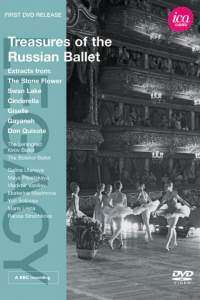|
Back
07/18/2012
Extracts from: The Stone Flower, Swan Lake, Cinderella, Giselle, Gayaneh, Don Quixote (music by Sergei Prokofiev, Pyotr Ilyich Tchaikovsky, Adolf Adam, Aram Khachaturian, and Ludwig Minkus
The Leningrad Kirov Ballet: Yuri Soloviev, Alla Sizova, Alla Osipenko, Anatoli Gridin (principal dancers), The Bolshoi Ballet: Galina Ulanova, Maya Plissetskaya, Vladimir Vasiliev, Ekaterina Maximova, Yuri Soloviev, Maris Liepa, Raisa Struchkova (principal dancers), Yuri Grigorovich (Choreography), The Covent Garden Orchestra, Niyazi (conductor), Bournemouth Symphony Orchestra, Alexander Kopylov, Algis Zhuraytis (conductors)
Recorded at ROH, Covent Garden, in the 1960s – 81’58
ica Classics ICAD 5074 – Picture format: 4:3 – Region Code 0 – DVD format NTSC – Sound, enhanced mono

   
The ica DVD compilation “Treasures of the Russian Ballet” of extracts from both the Kirov and Bolshoi Ballets filmed by the BBC in the 60s is, indeed, an invaluable trove of performance rarities from the Soviet era. The dancers were, in many cases, in top artistic form, but were overshadowed by the few who had defected to the world stage and international stardom. It is instructive to see these companies, at the height of their powers, even if they were at the mercy of the Kremlin.
From the dancers of the Leningrad State Kirov Ballet (now the Mariinsky Ballet) is the full first act of legendary choreographer Yuri Grigorovich’s remake of The Stone Flower a folk tale of a maiden and a village engraver. Principal dancers Yuri Soloviev and Alla Sizova have gorgeous chemistry and technique. Filmed in 1961, what strikes you instantly is the skill in which the cinematography is preserving the integrity of the performance, with dancers full bodies show through most of it.
Grigorovich, who later created Spartacus, as a nationalist ballet, does not show much choreographic range in this ballet, but, as these dancers thrillingly show, it has narrative intensity and technical precision. The use of pantomime and Russian folk idioms is masterful, especially in such ensemble as the “Dance of the Unmarried Men” with wily references to Cossack and czardas steps. The corps de ballet women are equally impressive in the ensemble lines, that backdrop for the electrifying presence of the mysterious and lithe Alla Osipenko. Serge Prokofiev’s score has both fire and intimacy and is lustily conjured by conductor Niyazi and the Covent Garden Orchestra.
Excerpts from The Bolshoi Ballet classical repertoire, mostly filmed studio stagings during the company’s 1963 season, fill out the collection. Here are some of the highlights.
Tchaikovsky’s Swan Lake Act 2 dancing at the Royal Opera House in 1956 with Yuri Fairi conducting the CGO, with Bolshoi stars Galina Ulanova as Odette and Nicolai Fadeyechev as the Prince performing the central pas de deux, flanked by the corps women. Fairi really pours on the symphonic melodrama and actually it fits the heavy drapery of Lev Ivanov - Alexander Gorsky’s, heavy handed classicism. Ulanova and Fadeyechev are a bit clunky in moments, especially under some stark spotlights and jarring camera angles, but the occasion of the tour and the duet’s amped-up theatricality makes this a historic performance.
Raisa Struchkova and Mikhail Lavrovsky fare better in the ballroom scene from Act 2 of Prokofiev’s Cinderella. Struchkova has glittering carriage and clean execution and Lavrovsky has the look of a prince, and it doesn’t hurt that he spins like a nuclear helix.
The legendary Maris Liepa is Albrecht to Ekaterina Maximova Giselle in the Act II pas de deux. Liepa, a fine actor, was part of the new crop of men who were redefining the role of the danseur. This couple lets this iconic choreography breath with their superb pacing. Maximova has lightning speed point work and airy carriage, while Liepa dances with subtle abandon.
Vladimir Vasiliev is the barber Basilio and Maya Plissetskaya the sultry Kitri in Minkus’ Don Quixote. Vasiliev, who will later have his greatest triumph creating the role of Spartacus, is so commanding, even when he has minor flaws in this performance. Vasiliev might not have the technical precision that became his trademark, but he attacks this role opposite and equally fiery and screen luminous Plissetskaya.
Much credit should go to the unaccredited cameramen and production crew at the BBC. They knew what they were doing, they filmed the dancers whole bodies, in tight screen composition and they traveled in group scenes to avoid a stagey distance. Foremost they worked the cameras to capture the performance level of the dancers, with aesthetic intimacy. The clarity of the black and white film stock also enhances detailing of these performers, who so powerfully embody the generations of Russian classicism.
Lewis Whittington
|